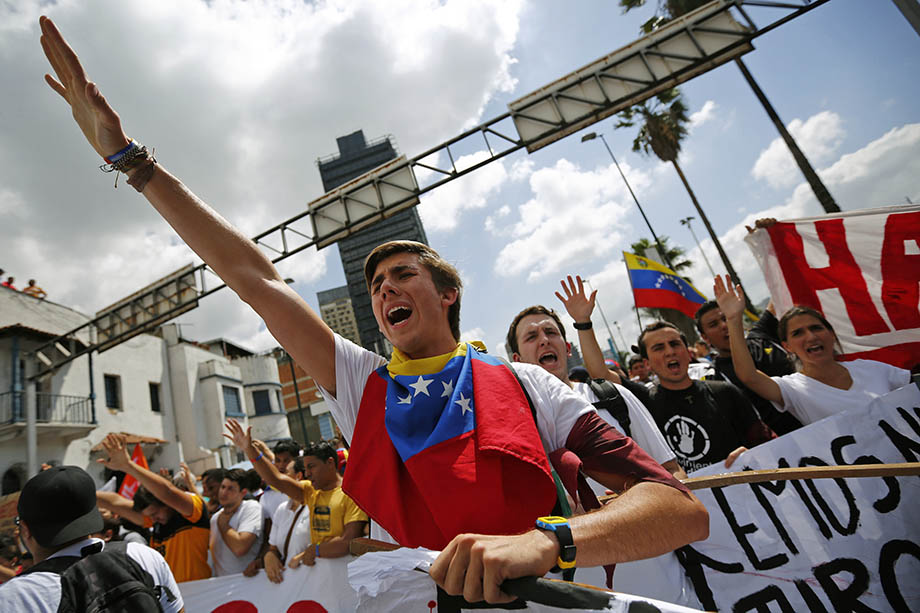The opposition in Venezuela upped its action against Socialist President Nicolas Maduro by kicking off a two-day national strike on Wednesday in an attempt to pressure him to cancel an election over a Constituent Assembly for the country.
Maduro says Sunday’s vote for the 545-seat assembly, which will have power to rewrite the national constitution and override the current opposition-led legislature, is designed to put power in the hands or ordinary people.
The opposition, which has majority support after years in the shadow of the Socialist Party during the rule of Maduro’s predecessor Hugo Chavez, says Maduro’s planned Constituent Assembly is a farce designed purely to keep him in power.
From dawn on Wednesday, neighbors gathered in some parts of the capital Caracas to block roads with rubbish, stones and tape, while corner cafes remained shut. There was still, however, a trickle of people on their way to work.
“We need to paralyze the whole country,” said Flor Lanz, 68, standing with a group of women blocking the entrance to a freeway in east Caracas with rope and iron sheets.
“I’m staying here for 48 hours. It’s the only way to show we are not with Maduro. They are few, but they have the weapons and the money,” added decorator Cletsi Xavier, 45, beside her.
Millions participated in a 24-hour shutdown last week, leaving businesses closed, families behind doors, and streets barricaded or empty across swathes of Venezuela.
Maduro, who calls himself “the son of Chavez” and flag bearer of his “21st century socialism” project, insists Sunday’s vote will go ahead despite intense pressure at home and abroad including a threat of US economic sanctions.
“We are going to decide between war and peace, the future or the past, the sovereign power of the people or the imperialist, oligarchical coup,” he told supporters late on Tuesday of the vote, which the opposition is boycotting.
State enterprises, including oil company PDVSA that accounts for 95 percent of Venezuela’s export income, were staying open on Wednesday. Public employees – who number 2.8 million in total- had strict orders not to skip work and to vote on Sunday.
Many Venezuelans, regardless of their political view, were fretting about the impact of further disruptions on their wallets – and stomachs. The OPEC nation is immersed in a brutal economic crisis, with shortages of basic foods and medicines.
“For me it’s a normal day. If I don’t work, I don’t eat. Who can risk their work in moments like this?” said Elio Jimenez, 40, who works at an oil refinery in the Paraguana peninsula.
Five people died during last week’s strike as National Guard troops seeking to dismantle blockades fired tear gas and rubber bullets at masked youths hurling stones and Molotov cocktails.
That took to over 100 the number killed since protests against Maduro began in early April.
There has been less enthusiasm for the strike calls in rural zones and working-class neighborhoods of Caracas where the ruling “Chavismo” movement has traditionally had its power base.
“I’m out all day every day trying to find work or waiting in line for food,” said casual builder Juan Manuel Fernandez, 58, who lives on a hilltop slum in Caracas with six dependents and relies on scarce, state-subsidized products for meals.
“So for me and my family, a strike means going hungry, so how can I be happy with that?” Fernandez added, saying Maduro should abandon the “crazy” Constituent Assembly but the opposition should avoid causing extra hardship for the poor.
Earlier, Venezuela’s best-known detained political leader, Leopoldo Lopez, issued a video overnight urging people to keep up protests.
In a video made while under house arrest, he called on the military to withdraw its support for a government plan to rewrite the constitution.
“I invite you to not be accomplices to the annihilation of the republic, to a constitutional fraud, to repression,” Lopez said in a video made from his home and posted on Twitter.
The military, along with the courts, has been a key pillar of support for Maduro through months of deadly street protests and widespread shortages.
Lopez called on Venezuelans to keep up their protests, insisting the government would not succeed “because of the determination, strength and conviction each of you have shown.”
Accusing the government of seeking to eliminate the democratic state, he said Venezuelans had to stop it through “peaceful struggle and a deep commitment to conquer democracy, peace.”
Lopez was placed under house arrest earlier this month after nearly three and a half years in a military prison.
